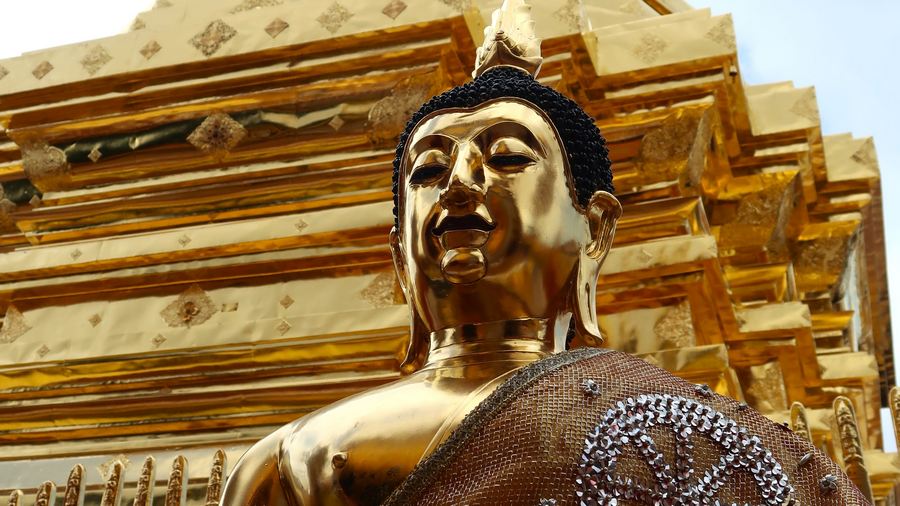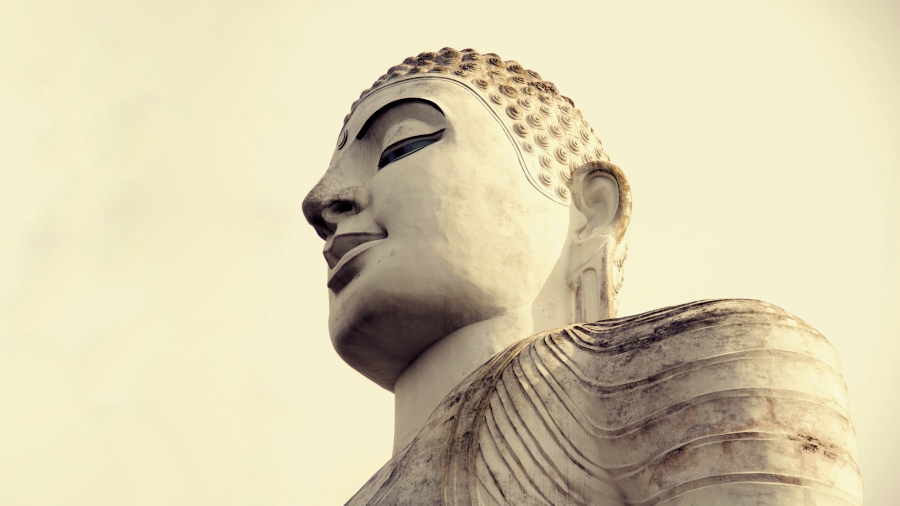[Note: Today’s sutta is very long, but it’s an important one when studying the Noble Eightfold Path. It includes the definition of two types of right view, right intention, right action, right speech and right livelihood.]
Thus have I heard. On one occasion the Blessed One was living at Sāvatthī in Jeta’s Grove, Anāthapiṇḍika’s Park. There he addressed the bhikkhus thus: “Bhikkhus.”—“Venerable sir,” they replied. The Blessed One said this:
“Bhikkhus, I shall teach you noble right concentration with its supports and its requisites. Listen and attend closely to what I shall say.”—“Yes, venerable sir,” the bhikkhus replied. The Blessed One said this:
“What, bhikkhus, is noble right concentration with its supports and its requisites, that is, right view, right intention, right speech, right action, right livelihood, right effort, and right mindfulness? Unification of mind equipped with these seven factors is called noble right concentration with its supports and its requisites.
View
“Therein, bhikkhus, right view comes first. And how does right view come first? One understands wrong view as wrong view and right view as right view: this is one’s right view.
“And what, bhikkhus, is wrong view? ‘There is nothing given, nothing offered, nothing sacrificed; no fruit or result of good and bad actions; no this world, no other world; no mother, no father; no beings who are reborn spontaneously; no good and virtuous recluses and brahmins in the world who have realised for themselves by direct knowledge and declare this world and the other world.’ This is wrong view.
“And what, bhikkhus, is right view? Right view, I say, is twofold: there is right view that is affected by taints, partaking of merit, ripening in the acquisitions; and there is right view that is noble, taintless, supramundane, a factor of the path.
“And what, bhikkhus, is right view that is affected by the taints, partaking of merit, ripening in the acquisitions? ‘There is what is given and what is offered and what is sacrificed; there is fruit and result of good and bad actions; there is this world and the other world; there is mother and father; there are beings who are reborn spontaneously; there are in the world good and virtuous recluses and brahmins who have realised for themselves by direct knowledge and declare this world and the other world.’ This is right view affected by taints, partaking of merit, ripening in the acquisitions.
“And what, bhikkhus, is right view that is noble, taintless, supramundane, a factor of the path? The wisdom, the faculty of wisdom, the power of wisdom, the investigation-of-states enlightenment factor, the path factor of right view in one whose mind is noble, whose mind is taintless, who possesses the noble path and is developing the noble path: this is right view that is noble, taintless, supramundane, a factor of the path.
“One makes an effort to abandon wrong view and to enter upon right view: this is one’s right effort. Mindfully one abandons wrong view, mindfully one enters upon and abides in right view: this is one’s right mindfulness. Thus these three states run and circle around right view, that is, right view, right effort, and right mindfulness.
Intention
“Therein, bhikkhus, right view comes first. And how does right view come first? One understands wrong intention as wrong intention and right intention as right intention: this is one’s right view.
“And what, bhikkhus, is wrong intention? The intention of sensual desire, the intention of ill will, and the intention of cruelty: this is wrong intention.
“And what, bhikkhus, is right intention? Right intention, I say, is twofold: there is right intention that is affected by taints, partaking of merit, ripening in the acquisitions, and there is right intention that is noble, taintless, supramundane, a factor of the path.
“And what, bhikkhus, is right intention that is affected by taints, partaking of merit, ripening in the acquisitions? The intention of renunciation, the intention of non-ill will, and the intention of non-cruelty: this is right intention that is affected by taints…ripening in the acquisitions.
“And what, bhikkhus, is right intention that is noble, taintless, supramundane, a factor of the path? The thinking, thought, intention, mental absorption, mental fixity, directing of mind, verbal formation in one whose mind is noble, whose mind is taintless, who possesses the noble path and is developing the noble path: this is right intention that is noble…a factor of the path.
“One makes an effort to abandon wrong intention and to enter upon right intention: this is one’s right effort. Mindfully one abandons wrong intention, mindfully one enters upon and abides in right intention: this is one’s right mindfulness. Thus these three states run and circle around right intention, that is, right view, right effort, and right mindfulness.
Speech
“Therein, bhikkhus, right view comes first. And how does right view come first? One understands wrong speech as wrong speech and right speech as right speech: this is one’s right view.
“And what, bhikkhus, is wrong speech? False speech, malicious speech, harsh speech, and gossip: this is wrong speech.
“And what, bhikkhus, is right speech? Right speech, I say, is twofold: there is right speech that is affected by taints, partaking of merit, ripening in the acquisitions; and there is right speech that is noble, taintless, supramundane, a factor of the path.
“And what, bhikkhus, is right speech that is affected by taints, partaking of merit, ripening in the acquisitions? Abstinence from false speech, abstinence from malicious speech, abstinence from harsh speech, abstinence from gossip: this is right speech that is affected by taints…ripening in the acquisitions.
“And what, bhikkhus, is right speech that is noble, taintless, supramundane, a factor of the path? The desisting from the four kinds of verbal misconduct, the abstaining, refraining, abstinence from them in one whose mind is noble, whose mind is taintless, who possesses the noble path and is developing the noble path: this is right speech that is noble…a factor of the path.
“One makes an effort to abandon wrong speech and to enter upon right speech: this is one’s right effort. Mindfully one abandons wrong speech, mindfully one enters upon and abides in right speech: this is one’s right mindfulness. Thus these three states run and circle around right speech, that is, right view, right effort, and right mindfulness.
Action
“Therein, bhikkhus, right view comes first. And how does right view come first? One understands wrong action as wrong action and right action as right action: this is one’s right view.
“And what, bhikkhus, is wrong action? Killing living beings, taking what is not given, and misconduct in sensual pleasures: this is wrong action.
“And what, bhikkhus, is right action? Right action, I say, is twofold: there is right action that is affected by taints, partaking of merit, ripening in the acquisitions; and there is right action that is noble, taintless, supramundane, a factor of the path.
“And what, bhikkhus, is right action that is affected by taints, partaking of merit, ripening in the acquisitions? Abstinence from killing living beings, abstinence from taking what is not given, abstinence from misconduct in sensual pleasures: this is right action that is affected by taints…ripening in the acquisitions.
“And what, bhikkhus, is right action that is noble, taintless, supramundane, a factor of the path? The desisting from the three kinds of bodily misconduct, the abstaining, refraining, abstinence from them in one whose mind is noble, whose mind is taintless, who possesses the noble path and is developing the noble path: this is right action that is noble…a factor of the path.
“One makes an effort to abandon wrong action and to enter upon right action: this is one’s right effort. Mindfully one abandons wrong action, mindfully one enters upon and dwells in right action: this is one’s right mindfulness. Thus these three states run and circle around right action, that is, right view, right effort, and right mindfulness.
Livelihood
“Therein, bhikkhus, right view comes first. And how does right view come first? One understands wrong livelihood as wrong livelihood and right livelihood as right livelihood: this is one’s right view.
“And what, bhikkhus, is wrong livelihood? Scheming, talking, hinting, belittling, pursuing gain with gain: this is wrong livelihood.
“And what, bhikkhus, is right livelihood? Right livelihood, I say, is twofold: there is right livelihood that is affected by taints, partaking of merit, ripening in the acquisitions; and there is right livelihood that is noble, taintless, supramundane, a factor of the path.
“And what, bhikkhus, is right livelihood that is affected by taints, partaking of merit, ripening in the acquisitions? Here, bhikkhus, a noble disciple abandons wrong livelihood and gains his living by right livelihood: this is right livelihood that is affected by taints…ripening in the acquisitions.
“And what, bhikkhus, is right livelihood that is noble, taintless, supramundane, a factor of the path? The desisting from wrong livelihood, the abstaining, refraining, abstinence from it in one whose mind is noble, whose mind is taintless, who possesses the noble path and is developing the noble path: this is right livelihood that is noble…a factor of the path.
“One makes an effort to abandon wrong livelihood and to enter upon right livelihood: this is one’s right effort. Mindfully one abandons wrong livelihood, mindfully one enters upon and dwells in right livelihood: this is one’s right mindfulness. Thus these three states run and circle around right livelihood, that is, right view, right effort, and right mindfulness.
The Great Forty
“Therein, bhikkhus, right view comes first. And how does right view come first? In one of right view, right intention comes into being; in one of right intention, right speech comes into being; in one of right speech, right action comes into being; in one of right action, right livelihood comes into being; in one of right livelihood, right effort comes into being; in one of right effort, right mindfulness comes into being; in one of right mindfulness, right concentration comes into being; in one of right concentration, right knowledge comes into being; in one of right knowledge, right deliverance comes into being. Thus, bhikkhus, the path of the disciple in higher training possesses eight factors, the arahant possesses ten factors.
“Therein, bhikkhus, right view comes first. And how does right view come first? In one of right view, wrong view is abolished, and the many evil unwholesome states that originate with wrong view as condition are also abolished, and the many wholesome states that originate with right view as condition come to fulfilment by development.
“In one of right intention, wrong intention is abolished, and the many evil unwholesome states that originate with wrong intention as condition are also abolished, and the many wholesome states that originate with right intention as condition come to fulfilment by development.
“In one of right speech, wrong speech is abolished…In one of right action, wrong action is abolished…In one of right livelihood, wrong livelihood is abolished …In one of right effort, wrong effort is abolished…In one of right mindfulness, wrong mindfulness is abolished…In one of right concentration, wrong concentration is abolished…In one of right knowledge, wrong knowledge is abolished…In one of right deliverance, wrong deliverance is abolished, and the many evil unwholesome states that originate with wrong deliverance as condition are also abolished, and the many wholesome states that originate with right deliverance as condition come to fulfilment by development.
“Thus, bhikkhus, there are twenty factors on the side of the wholesome, and twenty factors on the side of the unwholesome. This Dhamma discourse on the Great Forty has been set rolling and cannot be stopped by any recluse or brahmin or god or Māra or Brahmā or anyone in the world.
“Bhikkhus, if any recluse or brahmin thinks that this Dhamma discourse on the Great Forty should be censured and rejected, then there are ten legitimate deductions from his assertions that would provide grounds for censuring him here and now. If that worthy one censures right view, then he would honour and praise those recluses and brahmins who are of wrong view. If that worthy one censures right intention, then he would honour and praise those recluses and brahmins who are of wrong intention. If that worthy one censures right speech… right action…right livelihood…right effort…right mindfulness…right concentration…right knowledge…right deliverance, then he would honour and praise those recluses and brahmins who are of wrong deliverance. If any recluse or brahmin thinks that this Dhamma discourse on the Great Forty should be censured and rejected, then these are ten legitimate deductions from his assertions that would provide grounds for censuring him here and now.
“Bhikkhus, even those teachers from Okkala, Vassa and Bhañña, who held the doctrine of non-causality, the doctrine of non-doing, and the doctrine of nihilism, would not think that this Dhamma discourse on the Great Forty should be censured and rejected. Why is that? For fear of blame, attack, and confutation.”
That is what the Blessed One said. The bhikkhus were satisfied and delighted in the Blessed One’s words.
Read this translation of Majjhima Nikāya 117 Mahācattārīsakasutta: The Great Forty by Bhikkhu Bodhi on SuttaCentral.net. Or read a different translation on SuttaCentral.net or DhammaTalks.org. Or listen on PaliAudio.com or SC-Voice.net. Or explore the Pali on DigitalPaliReader.online.
Or read a translation in Lietuvių Kalba, Bengali, Català, Deutsch, Español, Français, हिन्दी, Magyar, Indonesian, Italiano, မြန်မာဘာသာ, Nederlands, Norsk, Português, ру́сский язы́к, සිංහල, Srpski, ไทย, Tiếng Việt, or 汉语. Learn how to find your language.





